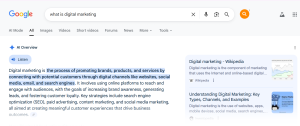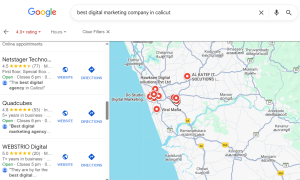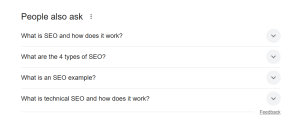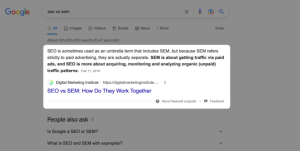
Search engines don’t work the way they used to. A year ago, you’d type a question, click through several blue links, and piece the answer together yourself. Now, Google often gives you the result instantly, right there on the search page. No clicks, no browsing, just the answer in a neat little box.
These are called zero-click searches. They can feel like a headache for website owners (less traffic!), but they can also be an opportunity if you know how to approach them.
Contents
What Exactly Is a Zero-Click Search?
A zero-click search happens when Google displays the answer to a query directly on the results page. The user gets what they need without visiting a website.
The most common types are:
AI Overview : An AI Overview is a summary that appears at the top of the Google SERP

Local Map Packs : business listings with addresses, reviews and hours.

People Also Ask : expandable Q&As related to the search.

Featured Snippets : short answers at the top of the page

Knowledge Panels : quick fact boxes for people, brands, or topics.

On the surface, this seems bad fewer clicks. But showing up in these spots means your content or business is still being seen, often by thousands of people. That visibility alone can build trust and authority.
Why Zero-Click Results Are Important
Yes, some clicks are lost. But the bigger shift in Search Engine Optimization is clear: it’s no longer just about driving traffic. It’s about becoming the source people recognize.
If your answer shows up in a snippet or a local pack, you’re being positioned as credible. Later, when someone is ready to dive deeper, make a purchase, or book a service, they’re more likely to remember your brand. In a way, it’s free advertising on Google’s front page.
How to Win at Zero-Click SEO
Here are five strategies that make a real difference:
- Answer Questions Clearly
Google loves straightforward answers. If you write content, start with the exact question “How much does car insurance cost in Dubai?” and follow it immediately with a one-sentence response. Then add context, examples, and nuance. This balance gives you a shot at being chosen for a snippet while still serving readers who want detail.
- Structure Your Content
Think about readability. Google scans pages for order and clarity, so give it what it wants:
- Numbered lists for steps.
- Bullets for features.
- Tables for comparisons.
A wall of text gets overlooked. A clean, scannable layout is much easier to feature.
- Prioritize Local Search
For physical businesses, the local map pack is critical. To show up there:
- Claim your Google Business Profile.
- Keep name, address, and phone consistent everywhere.
- Upload fresh photos.
Ask for reviews and respond to them.
I’ve seen small cafés boost walk-ins just by updating their hours and replying to reviews. These tweaks cost nothing but have real impact.
4.Implement Schema Markup
- Schema markup (structured data) is special code you can add to your webpages.
- It helps search engines understand your content more clearly.
By using schema markup, you increase the chances of ranking for more relevant search queries. It also improves how your page appears in search results, often making it stand out with rich snippets or enhanced listings that attract more clicks.
Target “People Also Ask” Questions
This box is basically a roadmap of what users are curious about. Research the questions that appear around your keywords, then create simple, direct answers for them. You don’t need to overcomplicate clear, conversational responses work best.
Build Definitive Resources
Google favors pages that feel like the final stop. That doesn’t mean endless word count, but it does mean depth and freshness. Cover related subtopics, use credible sources, and add visuals when helpful. If readers don’t need to check another site after yours, you’re on the right track.
Conclusion
Zero-click searches are here to stay, and with Google experimenting more with AI summaries, they’re only becoming more common. Some see them as competition; others treat them as a free stage.The reality lies in the middle. Yes, clicks may drop. But the brand recognition and credibility gained can pay off in the long run.
So instead of fighting the change, adapt:
- Give clear answers.
- Keep your content structured.
- Own your local presence.
- Use “People Also Ask” as inspiration.
Aim to be the resource people and Google trust.
At the end of the day, SEO isn’t just about the click anymore. It’s about being visible, memorable, and credible so when the user is ready to take the next step, they come to you.




